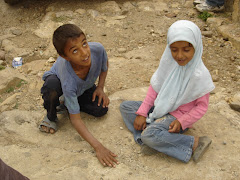WaPo: "What we think right now is that we just don't know how much their senior leaders know about the foreign fighter network," said the senior U.S. military official, who discussed intelligence matters last week on the condition of anonymity. "As you can imagine . . . if they knew, it's not something they would be talking about."
"But we do think that the knowledge of these networks exists at least within the Syrian intelligence community," he said. "What level, if it's low or high up, we just don't have a good gauge on."
Me: This is interesting, given the conventional wisdom on the split within the Syrian regime between the "old guard/hard-liners" (who made their political and economic fortunes under Bashar's father and were reluctant to support the new President because his economic policies shifted the patronage pipeline to a new group of elites), and those closer to the President himself, (composed jointly of modernizing government elites, many family members with significant capital assets and a healthy dose of traditional opportunists). It might be this "old guard" who have the personal contacts and institutional experience to track cross-border movements like this, and they might not be too eager to lend support to Bashar's regime (especially in support of Damascus' efforts to engage in a political dialogue with the US). If such a dialogue did take place and tangible benefits resulted, this would seriously compromise the resistance/nationalist/socialist rhetoric that this "old guard" relies on for public support.
The US bombing last fall on the Syria/Iraq border was allegedly targeting this very traffic, but in Syria the rumor was that there were Syrian intelligence officials at the sight that evening and they had some knowledge of the raid beforehand. It's hard to believe that US planes could cross into Syrian airspace completely undetected. It may be that they were aware of the raid, and that the Syrian security apparatus estimated that such an attack would weaken Bashar's public support (since a similar attack during his father's tenure would no doubt have triggered a stern response, a model that the security officials correctly estimated Bashar would not follow). However, it seems to have back-fired. The Syrian people took to the streets in protest and the American School was closed (and lots of Americans and Europeans who taught there were forced to leave the country). But instead of demanding action, most political elites used the raid as an example of Syrian restraint and the illegality of US military actions.
Despite the apparent "subversive Syrian intel" angle, I think the most interesting thing to come from the article is this:
WaPo: The flow of foreign fighters through Syria reached a high of 80 to 100 a month in mid-2007, the senior military official said, most of them would-be suicide "martyrs" increasingly recruited from extremist communities in North Africa by jihadist Web sites and networks abroad.
Me: So, although most of them passed through Syria, few if any of them are actually Syrian. I think this says a lot about the influence that domestic politics and economics can have on the creation or 'production' of terrorists. There are two possibilities: (1) the Syrian regime has been sufficiently cruel and barbarous to its indigenous religious opposition, preventing the rise of a uniquely Syrian terrorist network operating in Iraq or (2) the US allied regimes of North Africa (including Morocco, Egypt and Tunisia, although perhaps not Algeria) are for whatever reason not as effective at preventing the spread of extremism. This could be for a number of reasons, not all of them having to do with torturing religious opposition. For all its faults, Syria has significantly less income disparity and overall poverty than the countries of North Africa, and its government's refusal to adhere to US imperatives provides for a certain release valve. If Syrians cannot object to their own political system at least they can object to the US (and by extension Israel). Such talk is not tolerated in North Africa, and far from preventing the rise of extremism, it seems to channel it into concrete expressions of political violence.
You can read the article here.
Subscribe to:
Post Comments (Atom)

No comments:
Post a Comment